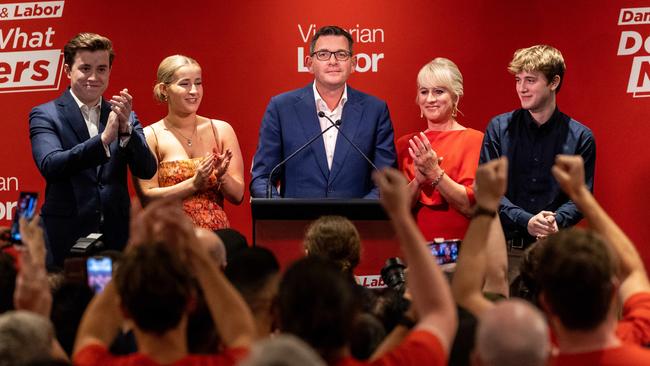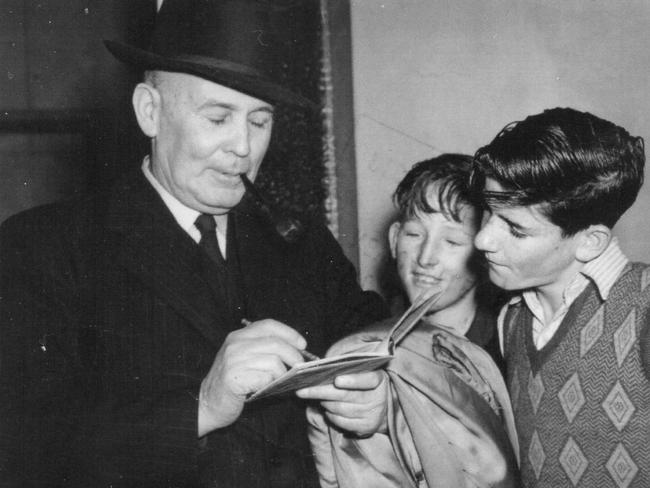
The ALP now controls the Commonwealth and all states except NSW and Tasmania, and the opinion polls say NSW follows next March.
At the same time, the industry superannuation funds, with their connections to the union movement and the ALP, dominate the capital markets of Australia.
In Victoria that power has impacted appointments and therefore decisions in the court system, and there is every reason to expect similar developments in the other ALP states which will spread to the High Court.
Chifley would be stunned that while the federal government might not control the banks as he had hoped, the industry funds in 2022 would be the banks’ largest and most influential shareholders.
And the capital power of the banks has now become second to those industry funds.
It is very rare in the global democratic world for one political party to have control or great influence over both the political and the capital process. Such unprecedented power in a nation carries obvious danger. Already, a previously naive business community is now suddenly aware of how it can be used to hit them.
The government wasted no time in demanding approval of the new industrial relations bill to increase the industrial power of the unions and help them to gain control of employees in family companies.
Further, increasing the power of the ALP, the main Australian opposition party, the Liberals, is in deep trouble.
Meanwhile, a pattern was set in the Victorian election which may will become the national norm – the two major parties, the ALP and the Liberals, believed high spending was the best way to attract votes and that the consequent ballooning of state debt was no longer important to voters.
While not as extreme as in Victoria, a similar pattern was seen in the federal election, and we can expect it to be duplicated in most of the other states.
In these circumstances, credit rating agencies and governance bodies become vital in teaching politicians the simple facts of the modern world.
Pre-election “spend-a-thons” without extra revenue or cost reduction will cause credit ratings will be downgraded, lifting interest rates and creating a vicious downwards cycle.
This danger was not appreciated by the major Victorian parties and the ranks of voters.
Heavily in debt, Victoria currently has the lowest credit rating of any of the Australian states.

The nation needs the credit rating agencies to act decisively by embarking on a Victorian action plan so the politicians and voters learn that the higher interest rate environment means the days of unlimited borrowing are over.
If the rating agencies do their job and make heavy borrowing painful, then both Federal and state governments will be looking to tap in the industry funds honey pot. Superannuation members need to be on the alert.
We are already seeing such pressure emerging to push the industry funds into funding so-called “social housing”.
Superannuation governance bodies need to make sure that the industry funds don’t get sucked into the political process and forget that their aim should not be to help out debt strapped governments, but rather to maximise returns for their members.
The Liberals (unlike the Nationals) have not really isolated what it is that they stand for.
They are still caught in the big company end of town, which has long since left them in favour of their main shareholder group and the ALP government network
Neither the federal nor the Victorian Liberal party branches understood that they will live or die by their ability to attract the base support of family business and their employees.
In the Commonwealth, the Liberals' disinterest in family business was highlighted when they demanded a whistleblower who revealed the truth about ATO attacks on family business be jailed for the term of his natural life.
The ALP also believes truth-telling about ATO attacks on family business deserves jail, but they are not as ruthless on truthful whistleblowers, so they have reduced the length of the jail sentence demanded.
In the state sphere, Victorian family businesses are about to hit with much higher energy costs. Consumers face the same burden.
Matthew Guy actually worked out a solution – the development of Victoria’s unique and immense low-cost Gippsland onshore gas reserves that do not require fracking and are next to the national pipeline.
Because they are dissolved in water, that water can be used to trigger a whole new approach to carbon storage in the roots of plants and a regeneration of farming methods.
At the same time, a power station based on the “low carbon” gas makes much more economic the current renewables installations.
Guy got excited about gas for a short time, but then resumed his unrestrained spending. Saving family business and the high cost of living was not high on his publicity agenda because there were so many spending plans to announce.
The Liberals also backed off because they were frightened of what might happen in inner city seats with the mention of the word “gas”.
It’s a very long shot, but it’s just possible that Daniel Andrews with control of the parliament for four years might just have pity on family businesses and those suffering cost of living pressures and develop the gas and start a whole new Australian carbon storage business.







Neither former Prime Minister Ben Chifley, who unsuccessfully tried to nationalise the banks in the 1940s, nor Paul Keating, who triggered industry superannuation some four decades later, could ever have imagined what is set to happen following the Victorian 2022 state election.